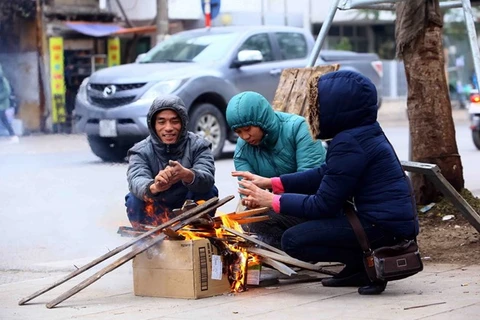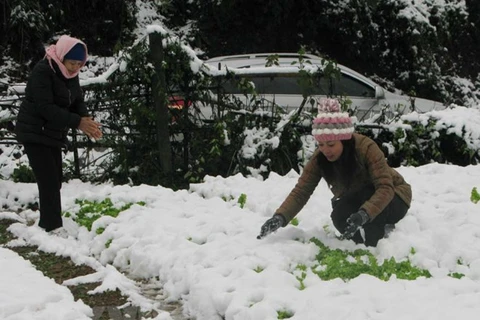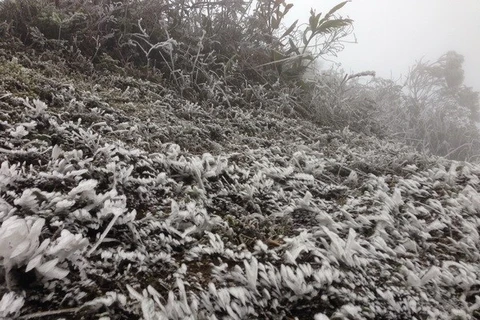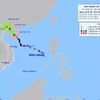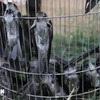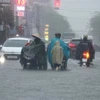 People burn firewood to keep warm at Pha Din Pass in the northern province of Dien Bien (Source: VNA)
People burn firewood to keep warm at Pha Din Pass in the northern province of Dien Bien (Source: VNA)Hanoi (VNA) - Prime Minister Nguyen Xuan Phuc has issued an official dispatch on urgently dealing with the cold wave that is affecting cattle and people alike.
The dispatch asks the people’s committees of provinces and cities in the north and north central regions to adopt plans and preventive measures against the cold wave.
According to statistics of the Department of Livestock Production under the Ministry of Agriculture and Rural Development (MARD), the cold spell has so far killed more than 2,000 cattle.
The mountainous province of Cao Bang has been the worst hit, with 670 cattle reportedly dead, followed by Lao Cai province (544 cattle), Dien Bien province (400 cattle), Hoa Binh province (250 cattle) and Lai Chau (200 cattle).
The Central Hydrology - Meteorology Forecast Centre predicted that the cold wave would continue to prevail in the north and north-central regions for a couple of days. These provinces might witness a strong cold spell after Tet (Lunar New Year) holiday, the centre said.
To cope with the situation, the Prime Minister has ordered the people’s committees to direct relevant agencies and local authorities to support local people in deploying measures to protect animals and plants.
According to the dispatch, localities can use its reserved budget for preventive work and support poor households or policy beneficiary families to buy food for cattle and warm up cattle farms as well as purchase biochemical substances to enhance the resistance of plants.
It is the responsibility of the local governments to report about the damage to the MARD so that timely assistance can be provided to affected farmers.
The People’s Committee of provinces and cities are accountable for the loss if it is caused as a result of not following instructions to care for cattle and plants in this weather.
The MARD has been assigned to frequently inspect, monitor the implementation of preventive measures against the cold wave and prepare plans for production recovery.
The Ministry of Health has been ordered to give recommendations on warming-up measures and ensure that adequate medicine is stocked in case of emergency.
The Ministry of Natural Resources and Environment has been requested to closely monitor the weather and give regular updates on mass media, while the Ministry of Information and Communications has been asked to direct press agencies to report more on the weather so as to keep the public informed.
Meanwhile, mountainous provinces in the northern region have actively come up with solutions to fight the cold wave.
The Department of Agriculture and Rural Development of Dien Bien province has adopted plans in response to the cold wave, which has caused damages to agricultural production and animal breeding.
Pham Thi Tuyen, head of the Division of Agriculture and Rural Development of Dien Bien province’s Tuan Giao district, said the division urged farmers to reinforce stables and store more feed for animals. The division was also working with local authorities to disinfect and clean up stables.
Farmers from Quai To, Quai Cang and Toa Tinh communes moved thousands of buffaloes and cattle to warmer areas to avoid the bad weather, Tuyen said.
In the northern mountainous province of Ha Giang, the People’s Committee of Quan Ba district, in collaboration with functional agencies, has instructed farmers to protect 21,000 buffaloes and cows. No death from cold or starvation among the cattle has been reported from here.
Similar actions have also been carried out by Hoa Binh province’s Department of Livestock and Veterinary to help people protect 6.6 million cattle.
“We have requested farmers not to graze cattle if the temperature drops to below 12 degree Celsius and to maintain a larger feed storage than usual”, said Bui Van Phuong, head of Yen Thuy district’s livestock and veterinary station in the province.
In related news, the Ministry of Agriculture and Rural Development has issued an urgent notice requesting localities and related agencies to implement measures to strengthen prevention and control of avian influenza A/H7N9 virus and other dangerous viruses intruding in Viet Nam.
Accordingly, the transportation, trading, slaughtering and consumption of poultry of unknown origin, or that has been illegally imported, is strictly forbidden.
Local governments were asked to coordinate with relevant forces including veterinary forces to closely supervise the gathering and trading of poultry in villages for timely detection and to strictly handle all cases of illegal transportation, trading and slaughtering of poultry illegally imported or of unknown origin.
The dissemination campaigns should be organised to inform local residents of the dangers of avian influenza and signs of suspected bird flu as well as provide guidance on measures to prevent avian influenza effectively.
The MARD also urged the localities to review the poultry slaughtering and trading spots at markets where live poultry are sold, organizing sanitation and disinfection of poultry selling areas every day.
At the same time, it assigned the Department of Animal Health to continue implementing surveillance activities to detect the emergence of virus so that it can be handled promptly.
Due to cold weather conditions, high humidity and an increase in transportation activities and an increase in the slaughter and consumption of poultry during the period before and after the Lunar New Year, the risk of continued outbreaks of avian influenza in the country and the possibility of influenza A/H7N9 virus infiltrating into the country is very high, especially in the northern border provinces and other provinces and cities which have high consumption of smuggled poultry, the notice said.-VNA
VNA
